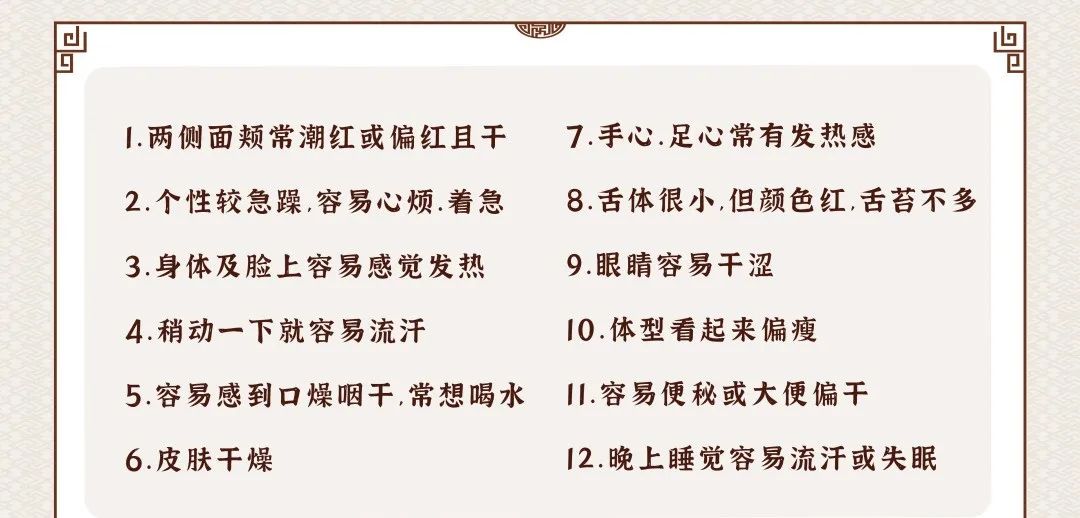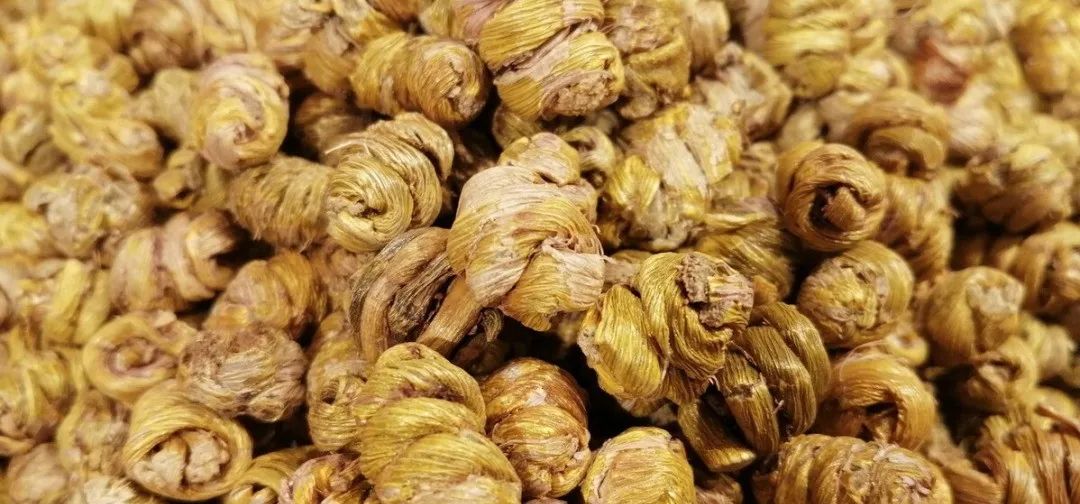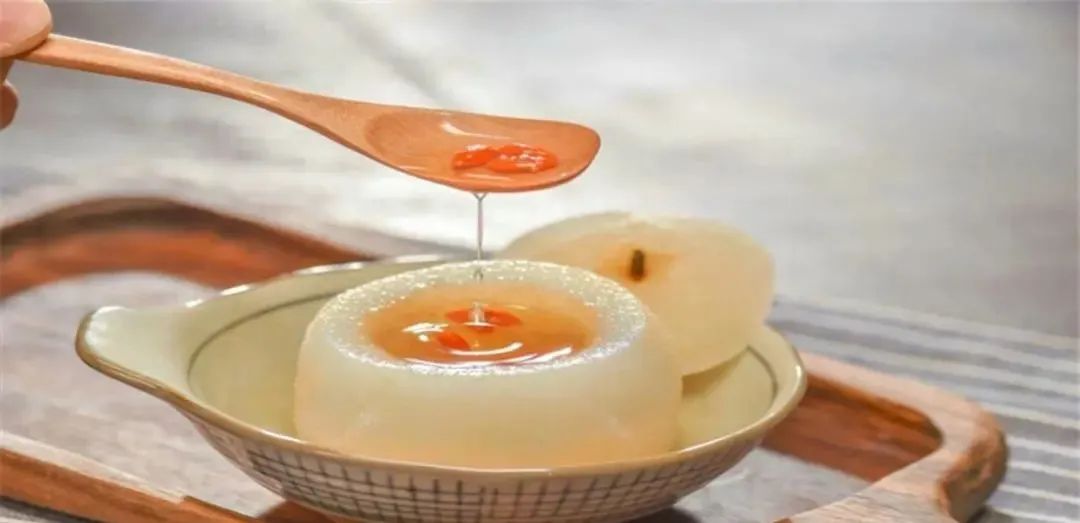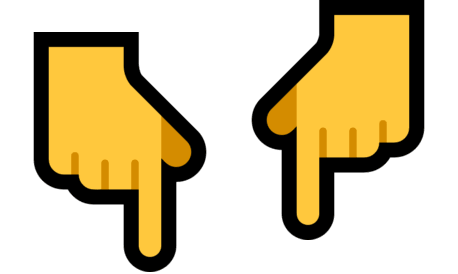Recently, have you experienced symptoms such as hot palms and soles, particularly dry skin, frequent dry mouth, and a constant thirst for water? Sometimes you may also suffer from constipation or dry stools. If you share these experiences, it may be related to your constitution. We recommend reading this article as it may be helpful for you.
In Traditional Chinese Medicine (TCM), human constitution is generally classified into nine basic types: Pinghe (平和型, Harmonious), Qixu (气虚型, Qi Deficiency), Yinxu (阴虚型, Yin Deficiency), Yangxu (阳虚型, Yang Deficiency), Shire (湿热型, Damp-Heat), Qiyu (气郁型, Qi Stagnation), Tan Shi (痰湿型, Phlegm-Damp), Xueyu (血瘀型, Blood Stasis), and Tebing (特禀型, Special Constitution). Today, Dr. Liu will specifically discuss Yin Deficiency: What is Yin Deficiency? What are its characteristics? How can it be regulated?
What is Yin Deficiency?

Yin Deficiency refers to a state of “lack of moisture” within the body. Yin represents various bodily fluids, including interstitial fluid, blood, tears, etc. In simple terms, Yin Deficiency means insufficient moisture and fluids in the body.
We can use an analogy: Yin is relative to Yang. Our body is divided into Yin and Yang, and health is based on the balance of Yin and Yang. We can liken Yang to a fire, while Yin is water. The human body is like a container; if the fire burns too fiercely, the water can easily evaporate. To achieve balance, we must continuously add water (nourish Yin) or, if there is too much water and not enough fire, we need to add fuel (nourish Yang) to maintain a balanced environment.
A Yin Deficient constitution indicates a lack of water and insufficient Yin, which can lead to two phenomena. The first is insufficient Yin fluids, causing various organs, tissues, and systems to lack nourishment, resulting in various physical discomforts. The second is that Yin Deficiency fails to restrain Yang, leading to excessive internal heat and conditions of insufficient moisture and excessive empty heat.
How to Determine if You Have Yin Deficiency?

If you identify with more than half of the symptoms shown in the images above, you likely have a Yin Deficient constitution. However, the characteristics of Yin Deficiency can vary among individuals. For example, those with Xin Yinxu (心阴虚, Heart Yin Deficiency) may experience palpitations, forgetfulness, and insomnia with vivid dreams; those with Fei Yinxu (肺阴虚, Lung Yin Deficiency) may have dry cough with little phlegm and night sweats; Gan Yinxu (肝阴虚, Liver Yin Deficiency) may lead to rib pain and blurred vision; Shen Yinxu (肾阴虚, Kidney Yin Deficiency) may present with lower back pain, dizziness, tinnitus, and in men, nocturnal emissions, while women may experience scanty menstruation; Pi Yinxu (脾阴虚, Spleen Yin Deficiency) may lead to gastrointestinal issues such as poor appetite, stomach pain, and constipation.
Factors Contributing to Yin Deficiency
1. Excessive Mental Strain
In today’s high-pressure lifestyle, the need to think about many issues can lead to mental exhaustion, depleting heart blood and resulting in Yin Deficiency. Additionally, excessive physical labor can also contribute to Yin Deficiency. The Spleen governs the muscles; overexertion not only harms the muscles but also weakens the Spleen. A weak Spleen leads to improper transformation and transportation, resulting in insufficient supply of essential substances to the organs, which can also lead to a Yin Deficient constitution.

2. Staying Up Late
Many people are forced to stay up late due to life pressures, while some do so voluntarily. Staying up late is particularly harmful to the Liver. Frequently staying up until two or three in the morning can significantly deplete liver blood, directly leading to a Yin Deficient constitution.
3. Dietary Habits
With improved living standards, many indulge their appetites without restraint, consuming both hot and cold foods indiscriminately. However, those who frequently eat fried and spicy foods, which are warming in nature, can easily deplete Yin fluids over time, leading to a hidden Yin Deficient constitution.
4. Natural Aging
Yin Deficiency can also occur with the natural aging process. As people reach a certain age, bodily functions decline significantly, and various diseases gradually surface. Chronic illness can also be a contributing factor to Yin Deficiency.
How to Regulate Yin Deficiency?

TCM emphasizes differential diagnosis and treatment. Different conditions require different regulation methods. For patients with Yin Deficiency, treatment primarily focuses on nourishing Yin. You can choose herbs such as Shan Yao (山药, Chinese Yam), Yu Zhu (玉竹, Solomon’s Seal), Shi Hu (石斛, Dendrobium), Mai Dong (麦冬, Ophiopogon), and Wu Wei Zi (五味子, Schisandra) for regulation.
In addition to targeted treatment, daily dietary regulation is also crucial. TCM classifies food based on the Four Qi (四气) and Five Flavors (五味). The Four Qi refers to “cold, hot, warm, cool,” while the Five Flavors refers to “spicy, sour, bitter, sweet, salty.” It is believed that sour and sweet flavors can nourish Yin, meaning that consuming more sour and sweet foods can help benefit Yin and generate fluids. Cold and cool foods, which are often high in water content, low in fat, and low in calories, can help replenish fluids. Therefore, patients with Yin Deficiency should moderately favor cold, sour, and sweet foods. Here is a nourishing Yin recipe that may help everyone.

Chuan Bei Bing Tang Li (川贝冰糖梨, Steamed Pear with Chuan Bei)
Effect: Pear nourishes Yin, moistens the lungs, and generates fluids for the stomach.
Preparation: Take 1 pear, 3 grams of Chuan Bei (川贝母, Fritillaria), and an appropriate amount of rock sugar. Peel the pear and remove the core; fill it with Chuan Bei powder and rock sugar, place it in a dish, and steam it until cooked.
Remember Follow us!
Follow us!
Editor’s Recommended Articles
1.Traditional Chinese Medicine: What Do Cracks on the Tongue Indicate? A Recipe to Solve Tongue Cracks
2. Why Does My Stomach Growl, and Why Am I Experiencing Gas, Diarrhea, and Unformed Stools? TCM Has Solutions!
3.So Precious! Over 800 Folk Remedies for Any Illness, Save for Future Reference!
4.Understanding Each Chinese Herbal Resource Compilation
Like is a form of encouragement Share to spread joy

